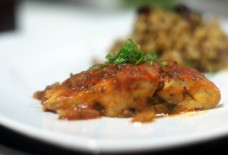Muhammara- The Festive Dip of Syria
By: Blanche Shaheen / Arab America Contributing Writer
For some people, a unique dip can add so much to a party. A simple appetizer like a dip can become a magnet of togetherness, initiating conversations and bringing people to a table like bees to honey. While hummus has become the king of all dips in both Arab and non-Arab homes alike, there is one dip with so much untapped potential to become just as popular, and that dip is Muhammara.
The word Muhammara in Arabic means to “make red” as many of the ingredients are red, from the roasted red bell peppers and pomegranate molasses to the paprika and tomato paste. While no two muhammara recipes are the same, the mainstay of this dip is walnuts, which adds protein, texture, and richness. This dip originated in Syria and is at once mildly sweet, smoky, tangy, nutty, and savory–the umami of all dips. Traditionally Syrians use the Aleppo pepper, which is hard to find, but you can use regular red peppers with a similar outcome. This dip is popular throughout the Levant and even in Turkey, where it is called “acuka.”
While roasted fresh red peppers enhance the flavor, you can use store-bought roasted peppers in the jar for a shortcut–the flavor is just as delicious and you save lots of time and mess in the kitchen especially during this busy time of year. While many middle eastern dips use beans or dairy in the base, Muhammara is vegan with no beans at all, so it is easier to digest.
Another key ingredient, pomegranate molasses should not be confused with pomegranate juice. The molasses is far more concentrated, having a more intense flavor and syrupy texture. You can find pomegranate molasses in most middle eastern stores as well as online. While breadcrumbs add heft and absorb a lot of the different flavors of this dip, you can leave it out if you are gluten intolerant or on a low-carb diet.
To add this festive dip to your holiday table, you can check out the tutorial of how to make this dip in the video below:
MUHAMMARA
- 1 cup walnuts, toasted
- 2 cloves garlic
- 1/3 cup bread crumbs (any kind will do, from panko to regular breadcrumbs)
- 1 tsp paprika
- 1 Tbs. tomato paste
- 1 tsp. cumin
- 1 tbs. lemon juice
- 1 Tbs. pomegranate molasses
- 1 tsp. ground Aleppo pepper (or a few dashes of cayenne-this is optional)
- 2 large roasted red bell peppers, skinned OR 1 7-oz jar roasted peppers
- Salt to taste
- 1/3 cup olive oil (extra for brushing peppers if you wish)
If using fresh peppers, roast them, (instructions next) otherwise use the canned red peppers and drain them and pat them dry with paper towels. For housemade roasted peppers, preheat the oven to broil setting. Wash and dry peppers and cut them in half, removing the inner rib and seeds. Line a baking sheet with aluminum foil. Brush the peppers generously with olive oil and bake for 10 minutes. Using the stems or tongs, turn the peppers over then broil for another 10 minutes. Remove peppers from the oven and let them cool until they’re easy enough to handle. Peel off the skins, and cut the pepper into smaller pieces. In a food processor, grind the garlic. Then add and mix the peppers, bread crumbs, lemon juice, tomato paste, pomegranate molasses, cumin, pepper, paprika, and cayenne, and a dash of salt to taste. While blending slowly stir in half of the olive oil until smooth. Add the walnuts and remaining oil, and pulse together until the texture resembles crunchy peanut butter, or blend until smooth if you prefer. Transfer muhammara to a container and refrigerate for at least a couple of hours, to allow the flavors to blend.
Blanche Shaheen is the author of the cookbook called “Feast In the Middle East, a Journey of Family and Cuisine” which you can order here: https://secure.mybookorders.com/mbo_index.php?isbn=9781545675113 She is also a journalist, and host of the popular cooking show called Feast in the Middle East. She specializes in the Arab cuisine of the Levant and beyond. You can check out her cooking video tutorials at https://www.youtube.com/user/blanchetv Her recipes can also be found at https://feastinthemiddleeast.wordpress.com/
Check out Arab America’s blog here!








